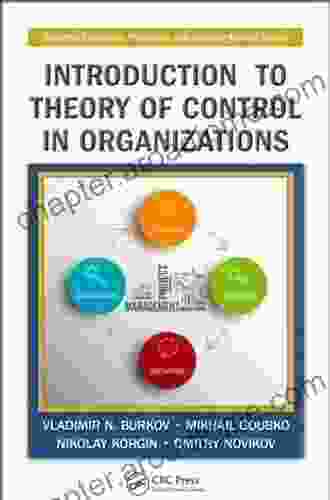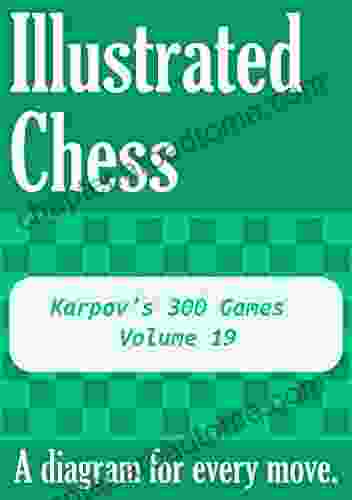Introduction to Theory of Control in Organizations: Systems Evaluation

Unveiling the Fundamentals of Organizational Control
In the ever-evolving landscape of modern organizations, understanding and effectively managing control systems is paramount to achieving sustained success. Organizations strive to maintain a delicate balance between autonomy and accountability, ensuring that individual actions align with the organization's overall goals and objectives. Enter the theory of control, a captivating field that provides a systematic framework for comprehending how organizations exercise control over their operations and systems.
5 out of 5
| Language | : | English |
| File size | : | 12877 KB |
| Print length | : | 346 pages |
Within the realm of organizational theory, control occupies a central position. It encompasses the processes, mechanisms, and structures that guide organizational behavior, ensuring that activities are aligned with strategic objectives. The theory of control in organizations provides a comprehensive toolkit for analyzing and designing control systems that foster organizational effectiveness. Through the lens of systems evaluation, organizations can gain invaluable insights into the interconnectedness of their systems and identify areas for improvement.
Embarking on a Journey of Systems Evaluation
Organizations are intricate networks of interconnected systems, each playing a crucial role in achieving the organization's mission. Systems evaluation offers a rigorous approach to assessing the effectiveness and efficiency of these systems, providing invaluable guidance for organizational improvement. By utilizing the theory of control, organizations can systematically evaluate their systems, identify areas for optimization, and implement targeted interventions to enhance performance.
The theory of control in organizations provides a framework for understanding how systems interact and influence one another. It offers a structured approach to systems evaluation, enabling organizations to:
- Identify key control points: Pinpoint the critical junctures within the organization's systems where control can be effectively exercised.
- Analyze feedback loops: Examine the mechanisms through which information about system performance is communicated and used to adjust organizational behavior.
- Assess the impact of control mechanisms: Evaluate the effectiveness of existing control mechanisms and their impact on organizational outcomes.
- Design and implement control systems: Develop and deploy tailored control systems that align with the organization's strategic objectives.
Delving into the Practical Applications
The theory of control in organizations is not merely an academic pursuit; it has far-reaching implications for organizational practice. By embracing the principles of systems evaluation, organizations can reap tangible benefits, including:
- Improved organizational performance: Control systems that are aligned with organizational goals and objectives enhance decision-making, resource allocation, and overall performance.
- Enhanced efficiency: Effective control systems streamline operations, eliminate redundancies, and reduce waste, leading to increased efficiency and productivity.
- Increased adaptability: Organizations with robust control systems are better equipped to respond to changing market conditions, technological advancements, and competitive pressures.
- Improved risk management: Control systems provide early warning signals of potential risks, allowing organizations to take proactive measures to mitigate negative consequences.
Bridging Theory and Practice: Case Studies and Examples
To fully grasp the practical applications of the theory of control in organizations, let's delve into real-world case studies and examples:
Case Study: Implementing a Balanced Scorecard for Performance Management
A Fortune 500 company implemented a balanced scorecard, a comprehensive control system that measures performance across multiple dimensions, including financial, customer, internal process, and learning and growth. By providing a holistic view of organizational performance, the balanced scorecard enabled the company to identify areas for improvement and align individual goals with the organization's strategic objectives. The result was a significant improvement in overall performance and profitability.
Example: Utilizing Feedback Loops to Enhance Innovation
A technology startup established a feedback loop system to capture customer feedback on new product releases. This system provided real-time insights into customer preferences and pain points, allowing the company to iterate rapidly, improve product design, and gain a competitive edge in the market.
: Empowering Organizations through Control and Evaluation
The theory of control in organizations offers a powerful lens through which organizations can understand and manage their systems effectively. By adopting a systems evaluation approach, organizations can optimize their operations, enhance performance, and navigate the challenges of the modern business environment with confidence. This comprehensive guide has provided a comprehensive overview of the theory of control in organizations, its application in systems evaluation, and its practical implications for organizational success.
To delve deeper into the fascinating world of organizational control and systems evaluation, we highly recommend the following resources:
- The Theory of Control in Organizations (Harvard Business Review)
- Systems Evaluation in Organizational Control (Emerald Insight)
- The Theory of Control in Organizations (ResearchGate)
Embark on your journey towards organizational excellence today by mastering the theory of control and embracing the transformative power of systems evaluation.
5 out of 5
| Language | : | English |
| File size | : | 12877 KB |
| Print length | : | 346 pages |
Do you want to contribute by writing guest posts on this blog?
Please contact us and send us a resume of previous articles that you have written.
 Book
Book Novel
Novel Page
Page Chapter
Chapter Text
Text Story
Story Genre
Genre Reader
Reader Library
Library Paperback
Paperback E-book
E-book Magazine
Magazine Newspaper
Newspaper Paragraph
Paragraph Sentence
Sentence Bookmark
Bookmark Shelf
Shelf Glossary
Glossary Bibliography
Bibliography Foreword
Foreword Preface
Preface Synopsis
Synopsis Annotation
Annotation Footnote
Footnote Manuscript
Manuscript Scroll
Scroll Codex
Codex Tome
Tome Bestseller
Bestseller Classics
Classics Library card
Library card Narrative
Narrative Biography
Biography Autobiography
Autobiography Memoir
Memoir Reference
Reference Encyclopedia
Encyclopedia Steven W Lockley
Steven W Lockley Myra Schneider
Myra Schneider Michele R Davidson
Michele R Davidson Nancy Siskowic
Nancy Siskowic Nicola Graimes
Nicola Graimes Timothy Orwig
Timothy Orwig Viktor Moskalenko
Viktor Moskalenko Miriam L Kingsberg Kadia
Miriam L Kingsberg Kadia Thomas Kirschner
Thomas Kirschner Sebastian G B Amyes
Sebastian G B Amyes Robert C Hackney
Robert C Hackney Neil Sheehan
Neil Sheehan Mike Lee
Mike Lee Santiago Duque
Santiago Duque Michelle Mcclain
Michelle Mcclain Nicci Gerrard
Nicci Gerrard Mikhail Petrunin
Mikhail Petrunin Tim Madigan
Tim Madigan Nancy Moser
Nancy Moser Ziheng Yang
Ziheng Yang
Light bulbAdvertise smarter! Our strategic ad space ensures maximum exposure. Reserve your spot today!

 Michael ChabonUnlock Your Health Potential: A Simple and Effective Three-Step Plan for...
Michael ChabonUnlock Your Health Potential: A Simple and Effective Three-Step Plan for...
 Ivan TurnerDiscerning Truth in an Age of Error: Your Guide to Navigating Deception and...
Ivan TurnerDiscerning Truth in an Age of Error: Your Guide to Navigating Deception and... Branson CarterFollow ·3.8k
Branson CarterFollow ·3.8k Bryce FosterFollow ·8k
Bryce FosterFollow ·8k Vince HayesFollow ·16.7k
Vince HayesFollow ·16.7k William PowellFollow ·18.5k
William PowellFollow ·18.5k Gordon CoxFollow ·4.5k
Gordon CoxFollow ·4.5k Ed CooperFollow ·9.5k
Ed CooperFollow ·9.5k Doug PriceFollow ·2.9k
Doug PriceFollow ·2.9k Italo CalvinoFollow ·17.3k
Italo CalvinoFollow ·17.3k

 Samuel Beckett
Samuel BeckettPortrait of the Plague Doctor: A Chilling Tale of Fear...
Prologue: A...
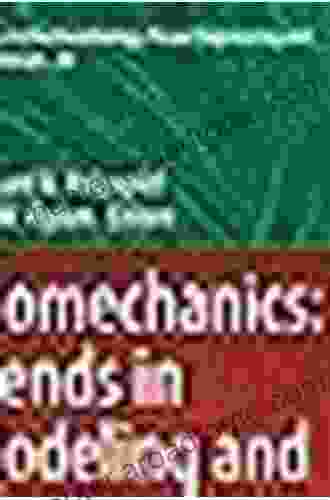
 Elliott Carter
Elliott CarterTrends in Modeling and Simulation Studies in...
Unveiling the Convergence of...

 Natsume Sōseki
Natsume SōsekiCells For Kids: Science For Children
Unlock the Microscopic...
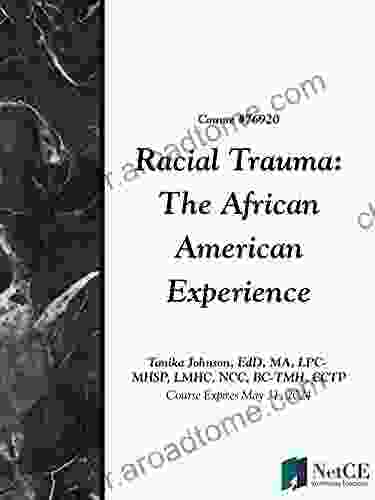
 Anthony Wells
Anthony WellsUnlock the Power of Understanding: Embrace the African...
Embark on a Journey of Truth,...
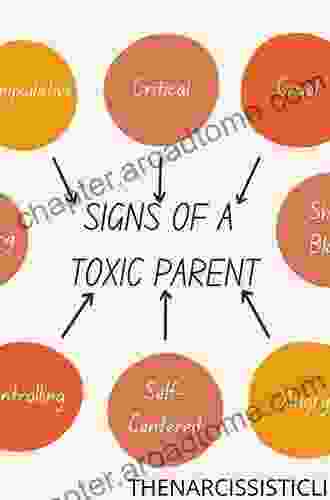
 Forrest Reed
Forrest ReedBreaking Free: Healing from Toxic Relationships Between...
Are you struggling...
5 out of 5
| Language | : | English |
| File size | : | 12877 KB |
| Print length | : | 346 pages |


